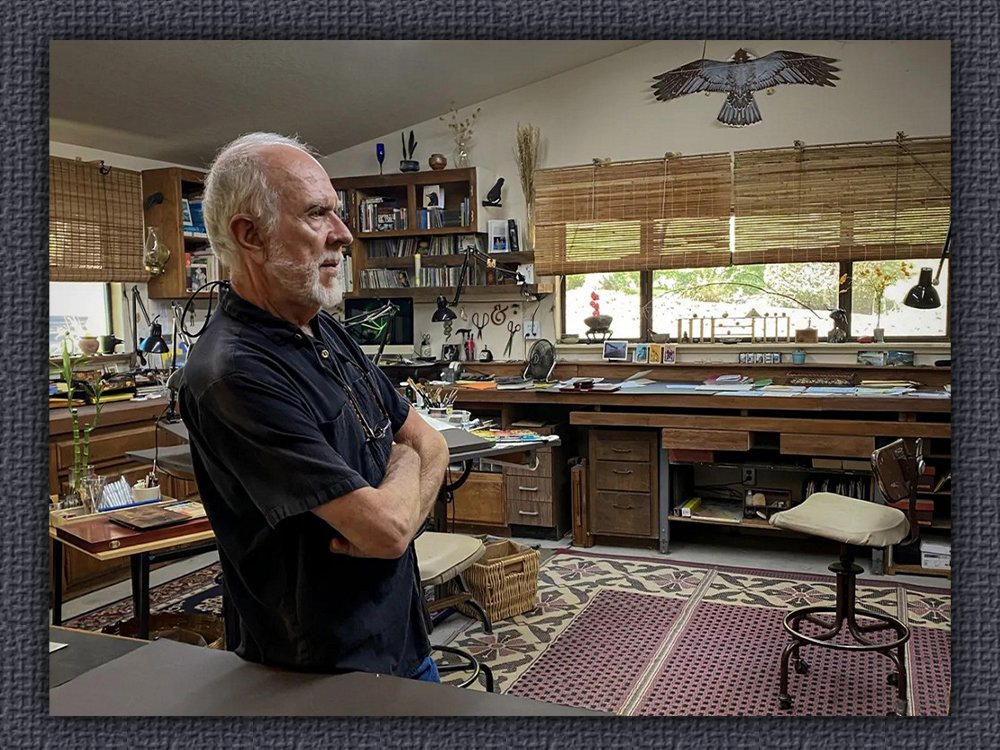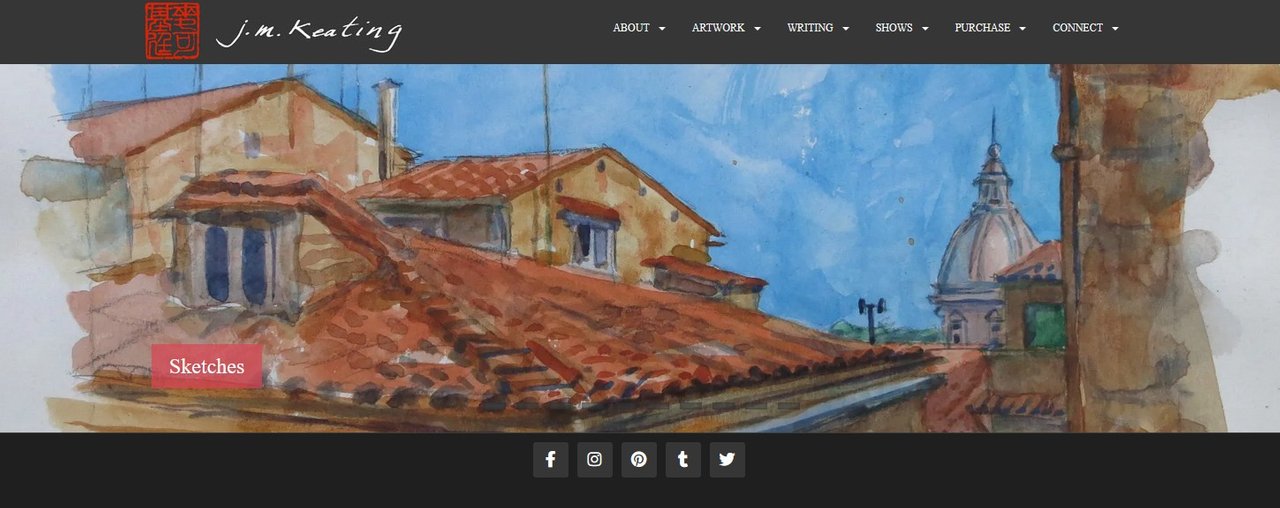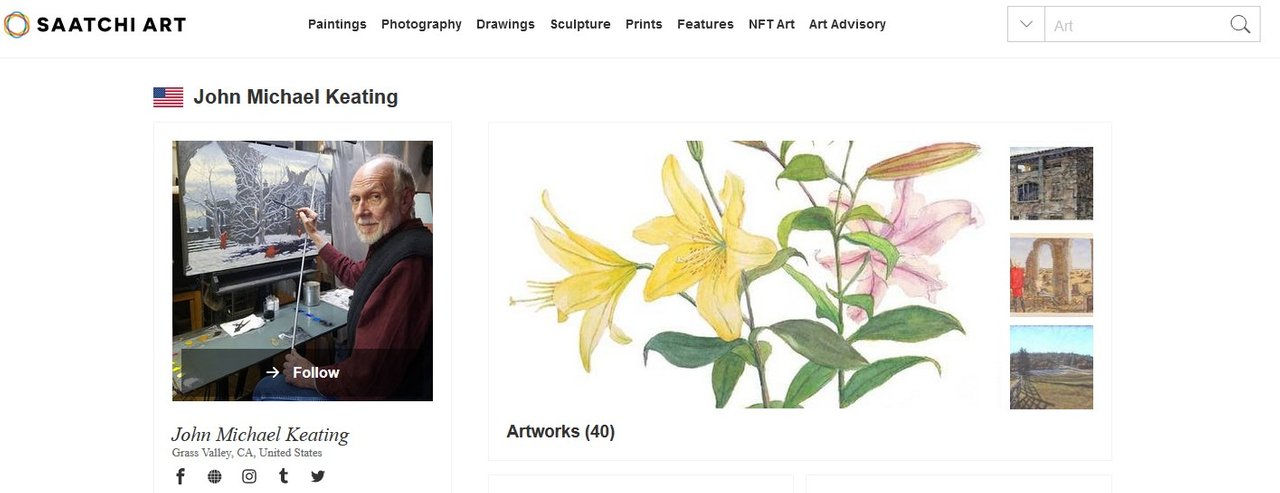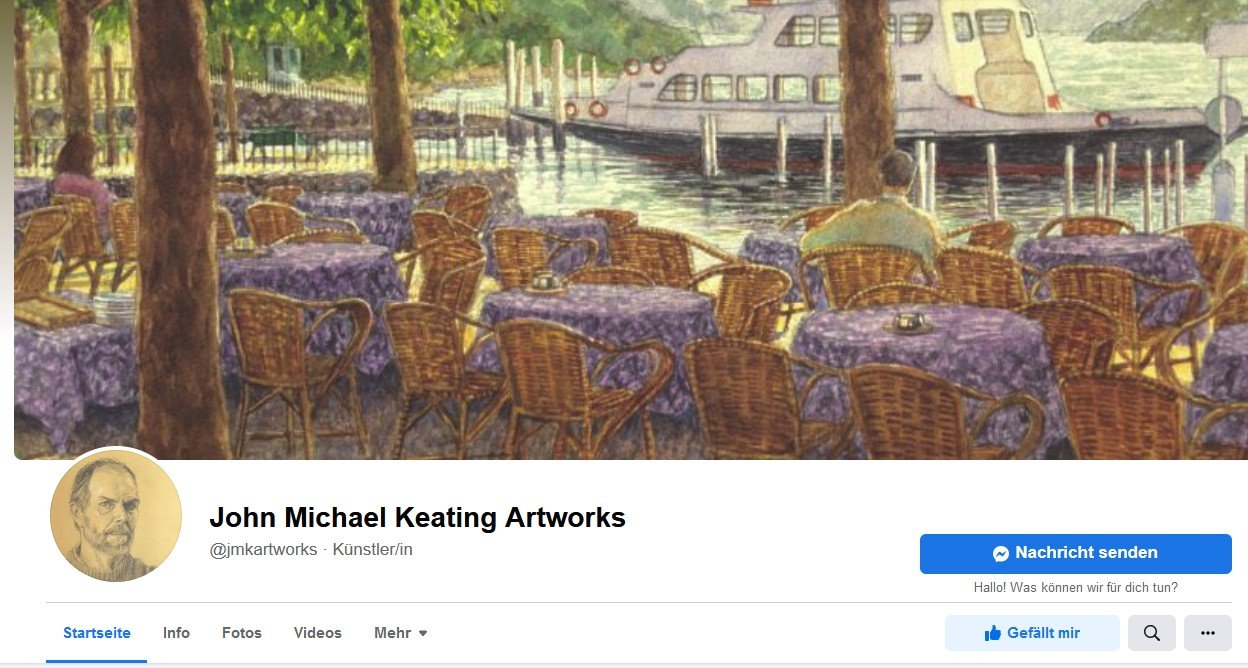
Hello my dear Steemians,
You might have noticed that we have few professional artists around and recently while seeing their blogs and their Artworks, an idea came to me. We have such great opportunity of such professional next to us who are there and happy to chat and may be to answer the questions that for example I always wanted to ask someone who made an Art into his life.
We, human all can draw from the time of our childhood but some develop it the others not. What is the secret or the moment when people decide to make an Art and express their life through that.
I have asked John Michael Keating, an Artist who lives in California, USA and actually currently very busy, despite of that he kindly agreed and I sent him my question and was excited to received the answers that I would like to present today as.


First of all, I would like to thank you for the chance to get do my first interview with the Professional Artist. There are always many different questions that we wish we could ask such people like you and hope that the users also will be glad to read and maybe discuss some of them in comment section.
Being an Artist is it a profession and anyone can be if works hard or is it a talent that people born with and just need to discover and bring it to its shine?
- It’s interesting that you begin the interview with the most difficult question instead of leaving it for last. My answer is that the “profession” of being an artist is a combination of both possibilities you suggest: Is being an artist a matter of inborn talent or a matter of hard work? Talent is really difficult to define. Whatever it is, it can’t exist unless it is fed, nurtured. What nurtures it is a lot of work, hard work. My first teacher insisted that “Talent “is spelled: “Sweat.” This was welcome news to me because I felt that I had no talent. So I thought that if I worked harder than everyone who already had talent, I could catch up to them, that my hard work would compensate for my lack of the talent they possessed.

When did you do your first drawing and when you knew that this is something you want to do for your life?
- I made my first drawings in grammar school and drew the same things boys of my age were drawing. This was just after WWII, so we drew airplanes and warships, the way younger people today draw dinosaurs and space monsters. After grade school I stopped drawing until many years later. When I was in Gonzaga University (in my early 20’s,) I was invited to be a member of what was called the “Honors Program.” This was an experimental offering of courses and seminars for so-called “advanced” students. As part of the curriculum we had to take one semester of drawing and one semester of painting. I enjoyed both classes, but then a friend “accidentally” introduced me to a professional painter in the city. His name was Herman Keys and he became my first teacher.
In university my major course of study was Philosophy and I had intended to go on to graduate school, get a PhD, and become a philosophy professor. Apparently, Life had other plans, because I began to spend Saturdays and then the rest of my free time in Herman’s studio. He made me draw with charcoal for a full year before I was allowed to paint. But even though he made drawing and painting really challenging and difficult, I discovered during those two years of being his apprentice, that I loved art, the making of art. So after graduation, I turned down scholarship offers and enrolled instead in the Art Institute of San Francisco. As I said, I had no talent, only desire, I mean, the determination to work harder than anyone else. So it took another four years of work to earn my Master’s degree.

You have had so many exhibitions by now, do you still feel a bit nervous before the opening ?
- Nervous before openings? No. I’ve found that viewers are usually curious and open-minded. In the case of what I paint, they’re often mystified as well, but that’s alright. Carlos Santana was asked about his reaction when people didn’t like his music. That didn’t bother him, he said, because his music was “an offering” that people could accept or not. Whatever their responses happened to be, he would keep on offering his music. My attitude is the same as his.

What is your favourite colour and what is favourite medium: watercolour, Oil etc.?
- Favorite color? I’m glad you asked me that because I can share a delightful poem with you by Rolf Jacobsen. It’s called “Cobalt.”
Colors are words’ little sisters. They can’t become soldiers.
I’ve loved them secretly for a long time.
They have to stay home and hang up the sheer curtains
of our familiar kitchen, bedroom and den.I’m very close to young Crimson, and brown Sienna
but even closer to thoughtful Cobalt with her distant eyes and
untrampled spirit.
We walk in dew.The night sky and the southern ocean
are her possessions
and a tear-shaped pendant on her forehead:
the pearls of Cassiopeia.
We walk in dew on late nights.But the others.
Meet them on a June morning at four o’clock
when they come rushing toward you,
on your way to a morning swim in the green cove’s spray.
Then you can sunbathe with them on the smooth rocks.
- Personally, I’m really fond of cinnabar. She gets her inviting and warm red glow from mercury sulfide, which is toxic and dangerous to use. So even though she was a pigment loved by the ancients, especially in China, she’s largely been replaced in the modern palette by Cadmium Red Light.
As for a favorite medium, I enjoy working with oils. However, I seem to use watercolors more because they are easier to sketch with and to carry while traveling without getting everything messy.

Do you keep any favourite early work and why?
- No, I don’t keep any early works. I want to share them, but it is often not easy. When I die I don’t to leave behind a mess that someone else has to clean up. So at this point of my life, whatever works I don’t sell I will give as gifts to people I love.

Could you give an advise to users who would like to start drawing, what they should start with, any tricks?
Advice? ....If you want to draw, just draw. I know there’s a desire to “be an artist,” and there’s nothing wrong with that desire; it will get you through some tough times. But “artist” is a noun, and making art is not a noun, it’s a verb. It’s a process that takes time and effort. The action, the doing, the working in the studio for hours after everyone else has gone to bed is what makes the difference. I can sum up everything in three words: You must Practice.
Any tricks?....Oh yes, but let’s just call them suggestions:
Draw anything and everything. Sketchbooks are indispensable. I may forget to take my cellphone or the grocery shopping list with me when I leave the house in the morning, but I never forget my sketchbook, even if I don’t find occasion to actually use it. Its presence in my hand reminds me to pay attention. “The world offers itself to your imagination,” says Mary Oliver in her poem, “Wild Geese.” She’s wise. But if you don’t pay attention to the world offering itself, her wisdom does you no good.Be easy on yourself. Don’t worry about making mistakes in your book, it’s only paper, after all. Draw anything and everything. Your searching is the most important thing. I never feel I understand anything until I have drawn it, or attempted to draw it, often unsuccessfully, but who cares? It’s only paper.
Accept your mistakes and your false starts, inaccuracies and missteps. They are yours. Embrace them. Forgive yourself and keep drawing.Oh, I almost forgot about teachers. Get as many as you need and listen to what they offer; they will help you find your voice. Pay particular attention to dead teachers, like Brueghel, Georgia O’Keeffe, Goya, Anna Ancher and Caspar David Friedrich.
Drawing is an extension of the sense of vision, the eye.
More important, it’s an extension of the hand and fingers, the sense of touch.
Most important, it’s an extension of the heart, of feeling.

While on Steemit we often come across plagiarism and also sometimes when users using the drawings of paintings of others and do the same themselves. In the past it was a lot of discussion especially about copyright. What is your opinion, when doing so should the user cite the source? Have you been yourself in such situation when someone used your work as a reference but did not ask a permission?
I do not know if you came across @thermoplastic Otto Rapp, he is Austrian Artist, who did a post about copyright due to a lot of arguments about that in the past. I just leave this link you might find it interesting.
@thermoplastic/of-copyright-issues-public-domain-creative-commons-cabbages-kings-and-fools
Nowadays, we do not have many professional artists and due to creating of Curation for Art that is run by the Steemit Team, there are sometimes user who do not know it is allowed to use something as reference but also if that should be mentioned or not.
- I was unaware of the particular controversy Otto Rapp addresses, so thank you for sending me the link. I agree with what he says and don’t feel that further comment from me is necessary.

My last question, where you get your inspiration? When you creating something is it inspired by something or someone and how it happens? Have you had time when you were not able to create?
- As I understand the word, “inspiration” refers to a sort of “invasion” of our normal lives by some energy in us or outside of us that we call spirit. This force gives us insights into things that would normally be hidden and also provides an urge to express the insight. In this sense, I seem to be inspired by nearly everything I come in contact with, both when I’m awake, and in dreams when I’m asleep.
In my view, if you don’t work at drawing, painting, sculpting, you’re unlikely to get inspired. I mean that working is a precondition for inspiration. Let’s turn this around and look at it from the point of view of the spirit, that is, whatever is doing the inspiring. Let’s say you were a spiritual force with the power to bestow “inspiration,” and you could give the gift to whomever you wanted.
Let’s say you had two candidates: (1) a woman who works daily at drawing or sculpting, or (2) a guy who paints now and then, but not very often because he “doesn’t feel inspired.”
The guy might feel more deserving of inspiration, but why would you give the gift to him? If he hasn’t worked hard enough to master the craft of painting, what can he do with your gift? So you inspire the woman who has developed skills to bring the inspiration into reality.
To return to the question, if you pay attention, “The world offers itself to your imagination.” Inspiration is everywhere. I have no idea how it happens; it just does. The problem then is what to do? What path to follow? The only answer I know is this: Practice. The answer will come to you from paying attention and working.







